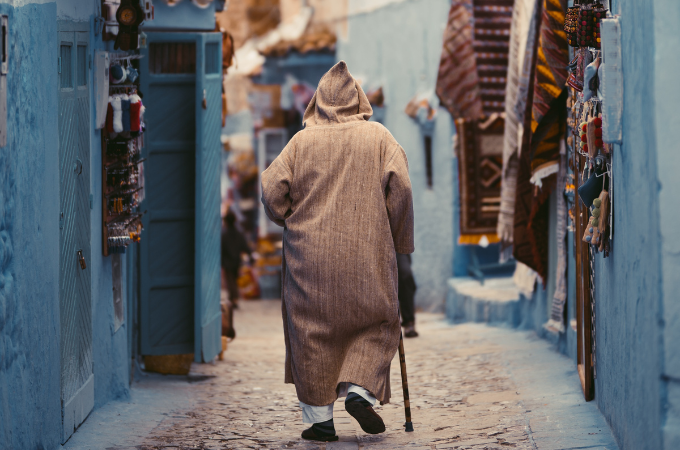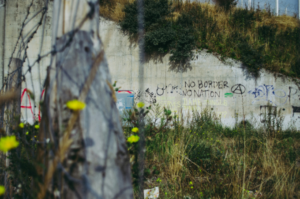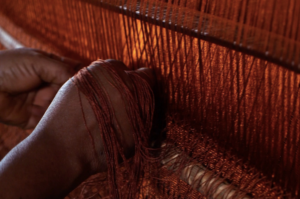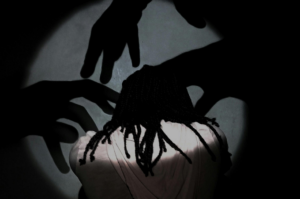
Tanalt was a small but bustling town of about twelve thousand souls with a thriving commercial hub, and the largest fruit and vegetable wholesale market in southern Morocco. Beyond its market, Tanalt was also noted for two things, its jail and its madhouse.
Each summer, when the market was at its peak, people flocked from all across the country to see the town, but they were frequently horrified by the large number of beggars in the streets. Idder Imntri, one of the residents of Tanalt, befriended many of those panhandlers by talking to them on a daily basis outside the Scheherazade Café, where he spent most of his time. He knew most of them by name, and when he had any money, which was not often, he would buy them a cup of tea. He made them laugh and tried, if only for a while, to help them forget their sorrows and agonies. He valued their company and believed that it was everyone’s responsibility to assist humanity because no one is a beggar by choice, and no one is more than a few misplaced steps from being one. He became well-versed in their way of life and their techniques of prying a few dirhams from a stranger’s sense of charity. It was for this reason that his close friends referred to him as Idder Imntri or Idder Beggar.
Idder, thirty-five years old and himself jobless, used to work as a photographer outside Ibn Hazem University’s main entrance. But with the proliferation of cell phones among selfie-taking students, his profession had become obsolete. He had sold his camera three years ago for barely enough to feed himself for two weeks and, with his pride like a tail between his legs, moved back with his family to Tanalt, a town fifty kilometres away from the university. However, it would be a mistake to think that Idder was unmotivated and careless. In truth, after earning his BA in English literature years ago at the very university where he later photographed the optimistic faces of the students, he had looked for work in a number of places but was continually turned down.
His great ambition was to become a high school teacher. Despite passing the written portion of the Ecole Normale Supérieure entrance exam every year, he always failed the oral portion due to his lack of confidence and poor English accent. But he was adamant about retaking the exam till he passed. Unfortunately, four months ago, his persistent dream turned into a nightmare when the Ministry of Education declared a thirty-year-old maximum age restriction for the recruitment of new instructors. Frustrated and irritated, Idder squandered his time in the café, playing cards, gossiping and writing poetry about his personal life both in English and Tamazight. Awaking only when the sun pierced his torn window curtain, and only after finishing his breakfast at noon, he cleared his throat and addressing the bleary-eyed poet in the cracked mirror, he recited the poem that he edited the night before. Every time Idder calculated the number of poems in his notebook, he was as pleased as punch. There were 56, most of which were written in Tamazight, his native language. He aspired to publish a collection of poetry one day or to perform them in front of an audience. He was conscious, though, that he was in the wrong spot.
His town did not hold any cultural events. Every day, its locals and tourists catered merely for commerce, and they considered any other activity a waste of time. In the town of Tanalt, three types of individuals could be identified: salespeople, public servants and beggars. Idder was unable to identify the category to which he belonged. Nonetheless, he tried to convince himself that he belonged to a distinct group of people, one he dubbed “intellectuals.” It was a category that he had created for himself and of which he was the sole member. He used to tell his buddies at the café, “No one else is worthy of the name intellectual in this town.” He was ecstatic with his self-given title, but he couldn’t survive on it alone. He needed money to sustain himself and his three siblings as well as his mother. Last year, his father, a mechanic in the old alley, died of cancer. His mother provided for her family by selling her husband’s garage. However, the money would not last so long because the rent for her house and the school supplies for his two high school siblings were both too expensive. She couldn’t work outside the house after being diagnosed with type three C diabetes. She fervently prayed that one day Idder would provide for the family. For that reason, Idder despised going home every evening. His mother’s monotonous rant irritated him. She would constantly remind him that he needed to find work to help support the family. To keep her at bay, he would occasionally scream in her face. But, since the day he found out about her diabetes, he would let her talk without interruption and then kiss her on the head before retiring to bed.
Tonight, Idder remained out late with his pals. He hoped that his mother would be sleeping, but unfortunately, she stood in front of him as soon as he opened the door, clothed in a house outfit, her eyes glowered, and her mouth loud as usual.
“Did you stay to clean the café?”
“Please, inna, mum, it’s midnight.”
“Aoudou billah. I seek refuge in Allah. Are you a man? You’ll live your life as a jobless bum. Your father, God bless his soul, started working at the age of 13. He worked in different jobs, and he relied on himself. You’re 35 and you haven’t worked a single day after long years at school. It’s shameful!” she said, then spat on the floor and headed towards the kitchen.
“Inna, mum you always say that. I’ll do something soon I promise,” Idder spoke almost in a whisper and shuffled away to his room.
Idder’s heart was pounding upstairs in his room, blood rushing to his cheeks. He sat on his wooden bed, contemplating his predicament. Inna is right, he grumbled, I have to do something or else. Sell from a cart, work as a store assistant, operate a tiny cab, or serve tables. Anything anywhere. Are you insane? Who is going to hire a thirty-five-year-old man to take a job only boys pursue? Nobody. I am an intellectual. How can I degrade myself to this extent? No! He chuckled as he glanced at his framed BA degree on the wall in front of him. They sent me home with a bachelor’s degree. Yes, I have gained knowledge at the university. I’m an intellectual, a real one. I know so much that I feel heavy with it. I have the ability to read and write. To think differently. But… I feel an irresistible urge to act, to lose no more time, to find a job and be a man. Can information be a hindrance? Probably, yes. I would have taken any job if I hadn’t known what I know today. I’m a fool. Is knowledge a means to success or a means to incarceration?
The final question piqued his interest enough to grab a pen and paper to explore the notion of success. On a fresh sheet of paper, he scrawled the question, but unable to begin formulating an answer, he just wrote the question again and again until the page was filled with his scrawl. He could not come with a satisfying response, most likely because his mind was convinced that knowledge was critical. He mumbled, I pretend that I have so much knowledge because I passed some university exams, but all I have are questions I cannot answer. I am merely a beggar for understanding, questions for my tin begging bowl. What was the point of studying all these ‘isms’? Modernism, existentialism, situationism, culturalism, feminism, post-modernism? Nothing. Absolutely nothing. Knowledge for the sake of knowledge.
In truth, many people Idder knew of rose to the top despite having no formal education. The majority of his local council’s elected members, including the president himself, were illiterate. Wearied by too much pondering, he threw the notes on the bed and slumped against the wall, gazing at the degree hanging on the wall. His eyes welling up with tears. He pulled out the notepad once more and he scribbled the word beggar in the middle of a paper, and with the word arose a mental image of Aami Ottman, Uncle Ottman, flashed before his eyes. Uncle Ottman, a mysterious old beggar, who rarely talked to people. He always stood at a corner near the Scheherazade Café, where Idder killed, or perhaps, as his mother might say, murdered his daily hours. Ottman just stood there, barefoot and shabbily clad, staring at the pavement and never saying anything. His left arm dangled from his shoulder in a filthy sling, and his right hand remained extended out like a statue’s stone appendage for hours, expecting to obtain some money from the pedestrians. Idder’s acquaintances in the café frequently discussed his peculiar way of begging. They were surprised to see someone who could stretch his arm all day long without experiencing any discomfort or pain. If that was me, one said, my arm would have cramped long ago. The loafers in the café considered him an athlete among beggars.
As part of his writing habit, Iddir closed his eyes and focused for a few minutes on the mental picture of Uncle Ottman. He then began slowly composing his 57th poem.
Aami Ottman
A beggar, trained to stretch his thin open hand
Like a sundial all the day long
And to gaze in feigned shame at the ground,
Wondering if it is fate or a man’s hate
To live like a damned insect in a dump
And be a shadow crawling in the dust.
On a corner of Independence Avenue, which he called his workplace,
He stood like a statue of Liberty around a heap of his collected junk,
Artifacts of street life, a museum of himself
Awaiting a dirham and maybe two
To fight his hunger for a single day.
Passersby, self-absorbed, numb and blind,
Walk past with purposeful pace.
To kids, he seems a wild toothless animal in the savanna of the city.
For their parents, he is a good example of a bad thing to teach a moral lesson.
Those parents never give him a thing and teach charity.
Other parents hand a coin to a son
To drop on the rag laid out in front of him.
Their pitying gazes betray an inner satisfaction
Not to be in the same situation.
Their coins, spare drops of rain in a dry season,
Never reach the wrinkled seed of his hidden pain.
When, on rare occasions, he raises his head;
He thinks he is watching a patriotic parade
Part of him admires their shiny black shoes,
Their warm and woolly raglan coats
And he inhales the lemon cologne on their clean blouses.
Sometimes he wishes to have their lives.
At other times he wishes he were born dumb and blind
Instead of crippled.
With time, he grows firmer and calmer
He accepts that his lot can’t be better and devotes himself
To stinking up their world with his unwashed armpits and crotch,
And spreading his rat’s nest of junk on display
Where they will see it every day.
I did it, Idder wet his lips and almost yelled, Great! I’ll read it to Aami Ottman tomorrow, even if he doesn’t know English. He’ll probably be thrilled to hear that someone understands how he feels. There’s a part of me that admires all beggars, even the most difficult ones, like Aami Ottman. I feel sorry to see him in his uncomfortable position every day. Maybe this poem may bring him closer to me. He will be more open to me and to others. Idder finished his breakfast late on the following day and slipped his notebook into his pocket. On his way to the Scheherazade Café, he stopped to visit Aami Ottman, who was standing in his normal spot on Independence Avenue, hand spread out and eyes fixed on the ground, surrounded by his collection of junk.
In a quivering voice, Idder said, “Hello, Aami Ottman. How are you doing?”
No reply. Aami Ottman, hunched over, gazed blankly at his feet. “I’m here to tell you something. Yesterday, I wrote a poem about you. Yes, Aami, uncle I did.”
The beggar tilted his head back and looked sharply at Idder. “It’s a cursed morning when I see your face,” his voice was gravely, rattling as if rising from a throat that had not needed words for a very long time. “Get out of my sight and let me work.”
“Sorry. I just want to share with you the poem that I wrote last night.”
“You’re an idiot. I want something to eat, and you say you have a poem. Who cares about your silly things? Get out of here.” Idder stepped back at the violence of the beggar’s words, almost falling as he tripped over an empty water bottle that lay next to the beggar, who shouted again, “Get off my things, idiot! You don’t have a job, boy, do you? You gossip all day in the café and scribble things. Do you think you are Sidi Hammou Talb?”
“Who? I’ve never heard of that name.”
“You’re too busy doing nothing to know anything.”
“Have you been to school? You speak like a literate person.”
“Literate! During the cold months, I warm myself by burning my old poetry chapbooks and cook my dinner on the hundred unsold copies of my short stories.”
“But why?” stammered Idder, who had only ever dreamed of having his words reproduced in print, “Why don’t you sell them here instead of begging?”
“Are you nuts? Who still reads poems? I quit writing years ago. Look at my right arm. It’s broken. I can no longer write with it. Now, I hear voices around me.”
“What do you mean?”
“I want to appear a disabled person and I asked a doctor to break my arm.”
“You are crazy.”
“I’m not. You are crazy if you live without a cent to feed your tummy. Crazy when you are able, but you can do nothing. Crazy when you stay in a café doing nothing.”
“Yes, you’re right. I want to work, but I’m shy and unlucky. What should I do?”
“Break your leg and get yourself a crutch!”
“Break what?”
“Break one leg and be a beggar. You are already pathetic, so you might as well get people’s sympathy. Find a place of work outside some busy café or the entrance to the mosque and be like me.”
“No, thank you for the suggestion, but I need my legs.”
“Ok, then blind yourself and stop merely watching people coming and going in front of you. Hear their voices in the streets. Enjoy no end to jungle music around you.”
“No way! I need my eyes and legs. I need all my organs.”
“Ok, then keep your organs and die of hunger. If a chest is not fit to win a medal, give it tobacco. If a leg that does not score goals in a stadium, cut it out and throw it to the lions. Ha Ha! Get out of my sight, loser. Get on with your meaningless loafing so I can get back to work now. It’s almost noon, my clients are going home for lunch.”
Instead of continuing on to the café, Idder turned around and went home. He tossed his stuff on his bed and sat down to think. This is entirely insane. Even a beggar laughs at me. I’m wasting my time in this town. It’s shameful! I’ve got my BA and have not yet found a job. Yes, what use is my health if I can’t use it? Nothing! I’m a loser, as Aami Ottman put it. What if I do what he said? I shatter my leg, slash my hand, or become blind. My goodness! To be a beggar! Yes, we’re all those in need of Allah, no one but Him is rich. But I’m not a beggar and I don’t want to be one. Never! What a thought! This is just ridiculous. I feel compassion for them, but I don’t want to be one of them. Insanity! What is the common thread that binds sanity and insanity? My mind has turned into a battlefield. He drew a notepad and a pen from his backpack. He hastily began penning his new poem on insanity before the muse fled the madman. When he finished scrawling it, he read it aloud, nearly shouting each word, flinging his hands up in the air as if he were in a public demonstration. His mother yelled as she opened the door.
“Are you crazy or what? Why are you shouting?”
“Nothing. I’ve decided to do something with my life, Inna. I’ve an idea.”
“It’s never late, Aywi. My son. May you be safe from all evil. Start small and God will help you.”
“I’ll start very small. I’ll be a new person, Inna, mum.”
“Good, my son. May our Lord work things out for the best. Change yourself and be an able man.”
“No, Inna, mum. Not an able man, maybe a disabled one, but at least a man.”
“Break a leg, son. Get up now and look for your livelihood wherever it is. Don’t worry what people say. You can sell mints or even popcorn. Anyway, do something. Don’t be shy. A man is always a man. Go! May God bless each small step you take.”
“Yes, inna, mum I will start today.” Idder said, closing the door as he walked out of the house. The mother let out a deep sigh of relief, a fleeting smile on her face.
Photo by Taryn Elliott from Pexels










Ellen Rees April 13, 2024 09:23
I read Mohamed Mahour's story, 'Break a leg'. I reflected on the main character's predicament and his overwhelming despair. It made me think of how many talented people are in the world but have no opportunities to reach their potential. It must be difficult for an extraordinary person to live an ordinary life.